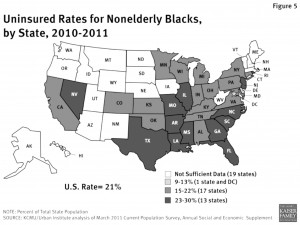Supreme Court ruling on ACA does not expand Medicaid
6th July 2015 · 0 Comments
By Frederick H. Lowe
Contributing Writer
(Special from NorthStar News Today) — Last week’s U.S. Supreme Court ruling upholding the landmark Affordable Care Act, or Obamacare, does not affect Medicaid expansion that would provide healthcare coverage to the nation’s poorest citizens, many of whom are African-American and live in the Deep South, because an earlier court ruling left that decision to the states.
Chief Justice John Roberts wrote the latest decision for the 6-3 majority in the in a case titled King ET AL. v. Burwell, Secretary of Health and Human Services, ET AL., which was decided on June 25. He was joined by Associate Justices Anthony Kennedy, Ruth Bader Ginsburg, Stephen G. Breyer, Sonia Sotomayor and Elena Kagan. Associate Justices Clarence Thomas, Antonin Scalia and Samuel Anthony Alito Jr. dissented.
Chief Justice Roberts wrote that the law requires creation of exchanges where individuals can compare and purchase insurance plans. In states that did not set up their own exchanges, the U.S. Department of Health and Human Services would set up one. Individuals are entitled to a federal tax credit whether the exchange is established by the state or HHS, he added.
Four individuals from Virginia, however, challenged the law because the commonwealth has a federally operated exchange rather than a state-operated exchange. Their lawyers argued they should not receive any tax credits because they did not have an exchange established by the state.
Although Chief Justice Roberts said that section of the law was “inartfully written,” the court’s majority ruled tax credits are available to individuals in states that have federal exchanges.
“The credits are necessary for the federal exchanges to function like their state exchange counterparts, and to avoid the type of calamitous result that Congress plainly meant to avoid,” Roberts wrote.
Although the ruling strengthens the Affordable Care Act, which President Barack Obama signed into law on March 23, 2010, it doesn’t address Medicaid expansion which would provide a greater number of uninsured African Americans with health care coverage.
In a June 28, 2012, decision titled National Federation of Independent Business v. Sebelius, the U.S. Supreme Court left Medicaid expansion to the states’ governors and legislators.
According to “Deep South and Medicaid Expansion: The View from Alabama, Georgia, Louisiana, Mississippi and South Carolina,” a report published in 2013 by the Joint Center for Political and Economic Studies, a Washington, D.C.-based think tank for Black elected officials, Medicaid expansion under the Affordable Care Act would help a much larger pool of low-income uninsured adults who earn below $16,000 annually.
The federal government would pay the entire cost of Medicaid expansion in the first three years and after that the states would pay 90 percent and the federal government would pay 10 percent.
Nineteen states have refused to expand Medicaid. The include the Deep South States, with large Black populations, of Mississippi, Alabama, Georgia, South Carolina and Louisiana. The state’s governor Bobby Jindal recently announced he is running for the Republican nomination for president. All of the Southern states have Republican governors and majority Republican legislatures. Alaska and Utah, however, are negotiating to expand Medicaid.
The overwhelming majority of Blacks who live in the five Southern states, however, support Medicaid expansion, according to the Joint Center study.
Some 8.042 million African Americans live in the five states, representing 21 percent of all Blacks in the U.S. , according to the U.S. Census Bureau. Alabama is 26.2 percent Black, Georgia is 30.5 percent Black, Louisiana is 32.0 percent Black, Mississippi is 37.0 percent Black and South Carolina is 27.9 percent Black.
Nationwide, just over 21 percent of non- elderly Blacks do not have health insurance, according to the Kaiser Family Foundation.
However, the likelihood of being uninsured varies widely across states, ranging from 9 percent of Blacks in Delaware to 30 percent in Louisiana. Uninsured rates for non-elderly Blacks are particularly high in the South.
The largest uninsured non-elderly Black populations reside in Florida (718,800), Texas (613,100), and Georgia (594,600). In addition, Blacks comprise a large share of the uninsured population in the District of Columbia (52 percent), Mississippi (48 percent), and Louisiana (42 percent), according to the Kaiser Family Foundation, which is based in Menlo Park, California.
Brookings Institution, a Washington, D.C.-based independent research group, recently reported that a growing number of states are considering Medicaid expansion.
Some 11.7 million people have enrolled in the Affordable Care Act through the Healthcare.gov platform.
More than 5.6 million enrollees were identified by race or ethnic group, including 789,498 African Americans who signed up for the Affordable Care Act during the open enrollment period from November 15, 2014, through February 15, 2012. Another 3.2 million who signed up for ACA did not declare their race or ethnicity.
This article originally published in the July 6, 2015 print edition of The Louisiana Weekly newspaper.




